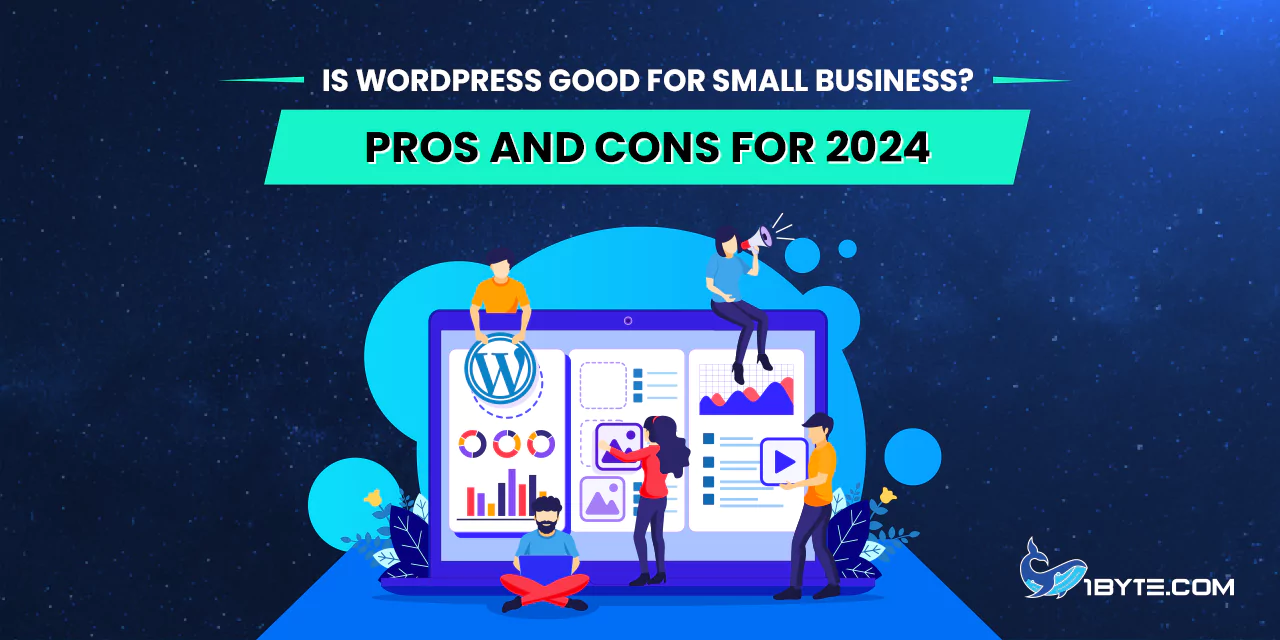Is WordPress good for small business? For entrepreneurs hoping to consolidate a strong online footprint in 2025, this is a key question. There are a lot of websites that are powered by WordPress, as you can imagine. But is it the right fit for your small business, though?
If you’re considering using WordPress for your small business, this is the article for you. In this article from 1Byte, we’ll cover the pros and cons of using WordPress for small businesses based on the most recent statistics and real world examples. Don’t forget that we’ll also provide comprehensive reports so you can make an informed decision. From a newbie to an existing tech savvy entrepreneur, this guide will educate you on whether WordPress is right for you or not.
The Importance of Choosing the Right Platform for Small Businesses
For a small business, knowing the right platform for success is a must. WordPress is well known, but it’s important to assess whether the pros and cons are highly compatible or, rather, just outweigh the cons.
Data recently reveals that WordPress runs approximately 43% of all websites on the internet. Its flexibility and large plugin ecosystem make it so popular. But for small businesses, it’s not all that simple. While WordPress is indeed worth considering, there are many others that need taken into consideration before deciding to throw one into the mix.
FURTHER READING: |
| 1. WordPress Multiple Domains: Managing Multiple Sites Efficiently |
| 2. How to Build a WordPress Website: A Beginner’s Guide |
| 3. How to Change Font in WordPress: Easy Customization Tips |
Possible alternatives to WordPress

There are many options available when choosing what the best platform for small business is and it isn’t just WordPress. There are several options available with their special offers. Here are some of the top alternatives to WordPress for small businesses:
FURTHER READING: |
| 1. How to Duplicate a Page in WordPress? |
| 2. How to Backup WordPress Site: A Complete Tutorial for Beginners |
| 3. What is a Favicon? The Small Yet Powerful Branding Tool |
Wix
With Wix, you can build a website with a drag and drop interface. It’s perfect for small businesses who just want to get up and running a website right away. For those selling products online, Wix also provides e-commerce tools.
Squarespace
Squarespace is famous for its visually elegant templates and user friendly design tools. If you’re looking for a sleek, modern website, then it’s a fantastic choice for businesses. In addition to e-commerce features and marketing tools, Squarespace also allows businesses to grow.
Shopify
Shopify is a wonderful e-commerce platform for online stores. On the other hand, it provides a list of customizable templates, secure payment gates, and inventory management tools. If you’re a small business selling products online, Shopify is perfect for you.
Weebly
Another drag and drop website that is easy to use is Weebly. Its choices in templates and e-commerce features make it appropriate for small businesses. SEO tools are also provided by Weebly to increase your website’s visibility.
Web.com
Web.com is an affordable website builder that also provides drag and drop editor, e-commerce tools and SEO solutions. For small businesses wanting a complete website with no big cash commitment this is a good option.
Joomla
Joomla is a content management system (CMS) with more flexibility than WordPress. It works best for moderately sized companies that require additional functionality and personalization. Joomla also has a great community behind it and loads of extensions too.
HubSpot CMS
HubSpot CMS is HubSpot’s content management system; it works together with HubSpot’s marketing tools. It’s perfect for small businesses that just need to manage your website and marketing in a single place. HubSpot CMS has all the necessary features for you with SEO tools, analytics, and social media integration.
They’re all strong and weak in their own ways, so it’s important to pick the one that fits your business best. For a more in depth article you can check out WordPress alternatives on Forbes Advisor or on WordPress competitors on WPBeginner.
Small businesses can consider these alternatives to find the perfect platform to help establish a powerful presence on the Internet and reach their goals. However, in a general sense, WordPress is still the best if you want a platform that offers all the necessary features.
Pros of Using WordPress for Small Business
WordPress is not slowing down anytime soon, with more than 43% of sites running on their platform. There is a reason for this popularity. Small businesses were especially fond of WordPress because of its ease of use, versatility, and the fact that there is a large internet community to rely on.

Cost-Effective
Small businesses are able to cost-effectively use WordPress. The platform itself is free and open source, so no licenses are paid. Also, hosting costs are relatively low, and most providers come in at around $2.75 per month. That’s why it’s a budget option for a small business that is in the business of launching its online presence.
WordPress is installed on more than 43% of the total number of all websites on the internet at this point in time, making it the most popular content management system (CMS). This massive use case makes obvious that there are enough free resources, themes, and plugins, which reduce costs more.
Moreover, the ecosystem of WordPress comprises a large community that contributes to it in the form of developers and users. That’s why small businesses can reap the benefit of intellectual property knowledge nearby without paying any extra costs.
We find that overall, WordPress is a good bang for a buck and a good way for small businesses to be able to afford to create and maintain a professional presence for their business.
Ease of Use
WordPress is a user friendly platform that makes it the perfect tool for small businesses. The platform offers a drag and drop editor that makes creating and managing content easy. This feature makes it less demanding for business people to work out their web pages without going through extreme specialized knowledge.
For the foreseeable future, WordPress will remain the market leader among all the CMSes in 2024, with over 43.5% of all websites having WordPress installed. The fact that it was adopted so easily and widely proves that ease of use and flexibility are its selling points. This robust ecosystem works well for small businesses because WordPress has tens of thousands of themes and plugins to use to customize their website.
In addition to that, WordPress has excellent documentation and an active community. There are tutorials, forums, and support groups to assist anyone who owns a business to overcome any challenges you might face. Such a support network makes sure that small businesses can pay for their updates and maintenance of their websites.
Customization Options
Customization is key for small businesses using WordPress. WordPress offers a wide range of options to tailor your website to your specific needs. Themes and plugins are the most popular tools for customization. For instance, Divi is a highly customizable theme that allows you to create custom layouts and designs without coding. It includes over 1,000 pre-made layout packs and a visual drag-and-drop builder.

Page builders like Divi and Astra provide extensive customization options. Astra, for example, is known for its performance and flexibility, allowing you to customize layouts, colors, typography, and more. Plugins add functionality to your site. WooCommerce, the most popular eCommerce plugin, helps small businesses set up online stores easily.
The WordPress Customizer is another powerful tool for making site-wide visual changes. It allows you to adjust colors, fonts, and other design elements. Child themes enable further customization without affecting the parent theme.
SEO-Friendly
For small businesses, WordPress is awesome because it comes packed with a lot of SEO friendly features. Another big benefit of WordPress is that it’s a user-friendly platform suitable for small business owners, as you don’t have to be a techie to manage your website. It’s easy to use and helps keep regular updates that search engines like.
WordPress has a huge collection of SEO plugins which helps optimize the code for the search engines. The most popular ones are Yoast SEO, All in One SEO pack. These plugins are all that it takes to be at the top of the search engine rankings by providing keyword optimization, sitemaps creation, creating meta descriptions, and much more.
SEO is part of WordPress themes’ design. Fast loading and mobile friendly with many themes built for both, is a good thing for SEO. Fast loading site improves user experience and lowers bounce rate and a mobile-friendly aspect of the site gives you a wider audience.
Furthermore, WordPress offers great customisation features that enable you to make your site according to your business needs. This flexibility gives the content a chance to be unique and engaging enough to stand out in search results.
For small business owners, WordPress has a strong community plus there’s a wealth of documentation, which can be used to implement great SEO strategies. It provides a community driven approach, so that businesses are kept up to date with the newest SEO practices and trends.
Scalability
Using WordPress for small businesses is scalable. WordPress can grow with your business, offering more pages, advanced features, and more traffic. Being this flexible is essential for companies that want to take their online presence further as time goes on.
According to the recent statistics, which are listed below, WordPress is the most popular content management system (CMS) globally and is responsible for 43.5% of all websites over the internet. That’s evidence that it is scalable and can be adapted to almost anything. It is also worth to note that WordPress’s share among the global CMS market is 62.7%, which is significantly more than what its closest competitors can accumulate.
For instance, if a small e-commerce business is using WordPress, he can get a basic web store and then gradually add additional features such as product review, customers accounts and more advanced payment options. This scalability allows the business to scale it without switching to a different platform, which saves time and money.
Additionally, the large plugin ecosystem covered by WordPress enables businesses to add functionality as they need it. It may integrate with CRM software, has some SEO tools, or has marketing automation, there’s likely a plugin out there that addresses the business need.
Cons of Using WordPress for Small Business
While WordPress is a powerful platform, it comes with its own set of challenges for small businesses.
Maintenance
A WordPress site can be very time consuming and very pricey to maintain. Keeping the site secure and working smoothly, involves regular updates. Failing to upgrade WordPress can create security vulnerabilities.
WordPress maintenance work includes updating your plugins and themes, backing up your site, and verifying if any links are broken. Small businesses using WordPress might experience downtime because of outdated plugins. Your sales and therefore customer trust can go down from this downtime.
A practical example could be that a small online store, using WordPress, may frequently have to update their WooCommerce plugin to guarantee compatibility with the latest version of WordPress. Such a thing, if neglected, can create checkout related issues, which will influence sales adversely.
This is why so many small businesses choose to maintenance services. There are options like WP Buffs and Fix Runner that offer full maintenance packages including security scan, performance optimization and regular backups. They can save business owners time and lower the risk of a site issue.
Security Risks
Small business security risks are there when you use WordPress. First of all WordPress is the most attacked CMS with around 90,000 attacks per minute because it is loved. In fact, this makes it a prime target for hackers. The 52 percent of WordPress vulnerabilities are from outdated plugins.
These vulnerabilities can be exploited by hackers to steal user information, install malware, or even spread it. Data breaches, for example, target small businesses and cost an average of $200,000.
To protect yourself, it’s important to keep WordPress core, themes and plugins updated. And implementing two factor authentication (2FA) and using strong passwords can also help with security.
Learning Curve
The steep learning curve is one of the main drawbacks of using WordPress for small businesses. WordPress is very powerful and incredibly customizable and while it’s great to have that power, it can take hours of work and an insane dedication to get the functionality you want. For those with more complex business needs, it may take you 6 to 12 months to fully understand its workings, while the basics can take beginners 10 to 12 hours.

Understanding these web technologies such as HTML, CSS and PHP is essential for WordPress. New users may also find it overwhelming to navigate the WordPress dashboard to understand how to manage the themes and plugins. For example, a small business owner wanting to start with an e-commerce store may not be able to add ecommerce plugins without knowing the technologies involved.
Additionally, the recent update of having the block editor has made it more complicated. It provides a shortcut of a sort for users who are used to the previous editor, and while eased the process of creating content it can be confusing. All this complexity can result in plugin conflicts and even website problems, and it can take time to address this.
Yet many of these challenges can be overcome using alternative resources. There are many online platforms that give comprehensive tutorials and courses on WordPress such as Skillshare, Coursera, and LinkedIn. These resources can provide step-by-step guidance and support to help small business owners effectively use the platform.
Leverage 1Byte’s strong cloud computing expertise to boost your business in a big way
1Byte provides complete domain registration services that include dedicated support staff, educated customer care, reasonable costs, as well as a domain price search tool.
Elevate your online security with 1Byte's SSL Service. Unparalleled protection, seamless integration, and peace of mind for your digital journey.
No matter the cloud server package you pick, you can rely on 1Byte for dependability, privacy, security, and a stress-free experience that is essential for successful businesses.
Choosing us as your shared hosting provider allows you to get excellent value for your money while enjoying the same level of quality and functionality as more expensive options.
Through highly flexible programs, 1Byte's cutting-edge cloud hosting gives great solutions to small and medium-sized businesses faster, more securely, and at reduced costs.
Stay ahead of the competition with 1Byte's innovative WordPress hosting services. Our feature-rich plans and unmatched reliability ensure your website stands out and delivers an unforgettable user experience.
As an official AWS Partner, one of our primary responsibilities is to assist businesses in modernizing their operations and make the most of their journeys to the cloud with AWS.
Conclusion
WordPress is still a top choice for small business owners. Its flexibility, scalability and a comprehensive ecosystem of plugins makes it an ideal solution no matter what size your business is. Cost effective and easy to use, small businesses have their choice of many free or cheap themes and plugins available when using WordPress. But of course there are some security vulnerabilities and maintenance requirements that business will have to face. In general, WordPress is a great option for small businesses to establish and grow their online presence, but it’s not without its flaws.

